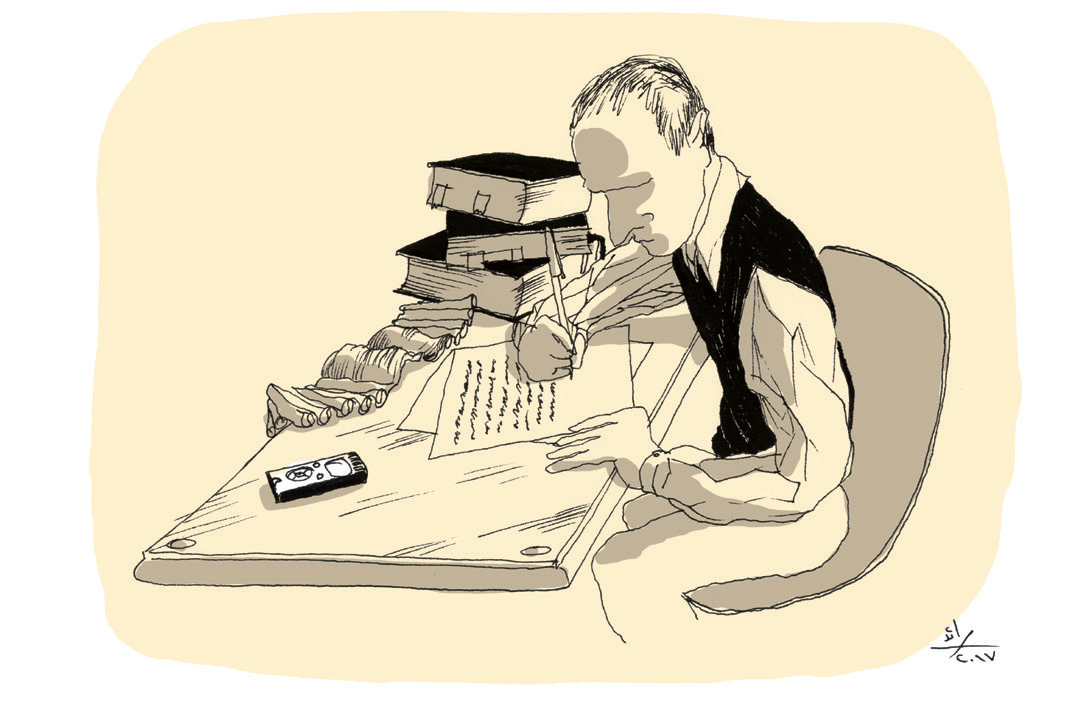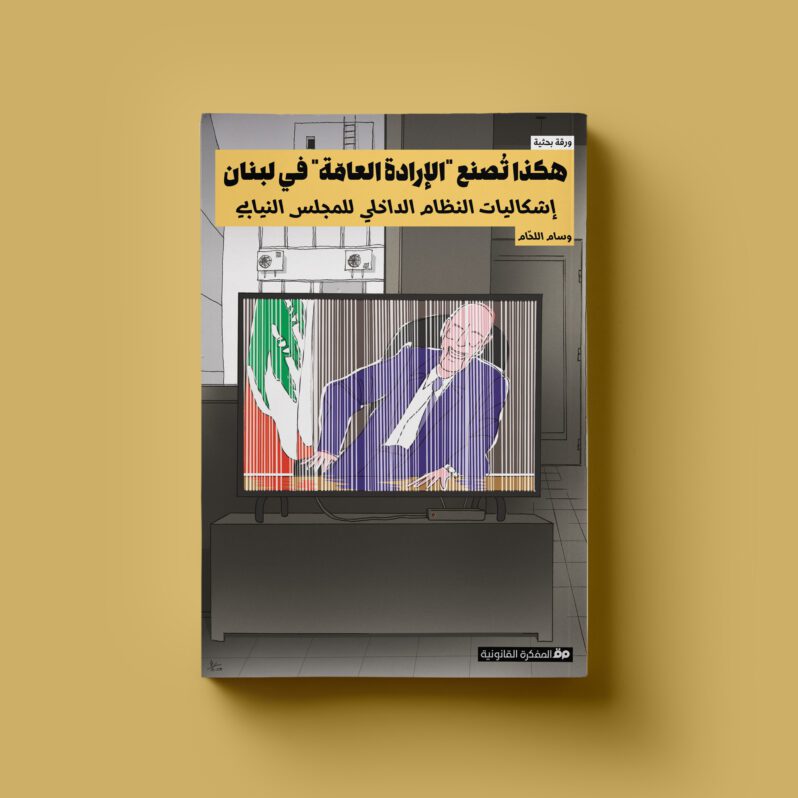Disciplining Nabil el-Halabi: Penal Punishment as a Path to Power

Lawyer Nabil el-Halabi heads the Lebanese Institute for Democracy and Human Rights (LIFE), a human rights organization that strives to document abuses, especially abuses against Islamists and Syrian refugees in Lebanon. LIFE was the first to expose the acts of torture that occurred in Roumieh Prison in 2015. While Lebanese Minister of Interior Nouhad Machnouk initially denied the organization’s claims, the leak of footage of the torture in June 2015 confirmed their veracity. El-Halabi continued to direct scathing criticisms at Machnouk and his team on various occasions. Most recently, he published on his Facebook page critical commentary implying that Ministry of Interior officials who had managed to acquire immense riches over a short period could be involved in cases of human trafficking (prostitution rings). This occurred following the arrest of the “Chez Maurice” ring, which it turned out could not have continued operating for years without the collusion of several security apparatuses. El-Halabi is also a political activist close to [resigned but acting] Minister of Justice Ashraf Rifi, and had recently helped several Lebanese security apparatuses negotiate with the kidnappers of Lebanese soldiers.
Despite all these attributes that make el-Halabi a powerful man by Lebanese standards, he was subject to pressure from security and judicial authorities after the minister of interior and his adviser, Maher Abou el-Khoudoud, filed two cases in April 2016. This pressure culminated in a raid on el-Halabi’s house, and his detention for three days. According to el-Halabi, he was also threatened with opening other files on him that would prolong his detention indefinitely, unless he signed a document that the minister of interior’s personnel presented to him. The document included a pledge, an apology, and an affirmation that Machnouk and his adviser are entitled to respect and esteem. The details of this case make it ideal material for studying how the penal system is used to repress persons who “attack” (albeit verbally) influential people. What applies to el-Halabi –a relatively “powerful” person and an expert in documenting abuses– applies a fortiori to the overwhelming majority of citizens who are certainly less in the know, and less capable of opposing. Before presenting the details of this case, we should note that it was clearly founded upon and derived its repressive outcomes from Machnouk’s power and influence. In fact, it is no exaggeration to say that the case and the violations therein constitute a display of just how much influence Machnouk has amassed and a consecration of his status as one of Lebanon’s elite political leaders [za’ama].
A penal system is generally a tool for imposing the state’s authority and restraining lawbreakers. However, this case shows once again that this system is used in Lebanon – a divided and weak country – primarily to socially sort litigants according to their power and, ultimately, to consolidate the authority of elite leaders who arise by repressing people who do not obey them. In such cases, the earnestness and vigor of the prosecuting bodies, the way that the elements of the crime are assessed, and the means of proof, are all determined by the power of the disputing parties. The effect is not to highlight and impose the rule of law. Rather, it is to entrench selective and discriminatory applications of the Criminal Code, the Code of Criminal Procedure, and – more generally – all the regulations relating to prosecution, and therefore to highlight the balances of power and define them if need be, as shown below.
Lifting Lawyers’ Immunity: Selective Application
El-Halabi’s case began with an attempt to lift the lawyer’s immunity. The Legal Profession Regulation Law does not permit the prosecution of a lawyer for a crime connected to the profession without the permission of the Council of the Bar Association to which said lawyer belongs. According to this law, the aforementioned Council alone assesses whether the act in question is connected to the profession. While el-Halabi argued that legal practice is not restricted to work in the courts, but encompasses his public activism defending rights and freedoms pursuant to Article 2 of the aforementioned law, the Bar Association’s Council hastened to declare within three days of receiving the request that the cited actions were unconnected to the profession. The Bar Association thus cleared the way for el-Halabi’s prosecution. It then made a similar decision about the complaint filed by Abou el-Khoudoud, Machnouk’s adviser.
While characterizing actions in this manner is theoretically acceptable for the sake of limiting the scope of immunity, the Council’s stance was remarkable because of the haste with which it was adopted. The Council’s application of its powers in this matter also seems very selective given its earlier and later positions in other cases. In this regard, it suffices to mention two cases that gained the public’s attention. In the first, the Bar Association delayed assessing whether the attack of a lawyer and mayor on his wife is a matter connected to the profession. Examining the issue took more than a month, despite intense media coverage. In the second case, the Council maintained that an attempt by two lawyers to peddle influence that was caught on camera was an act connected to legal practice and therefore withheld its permission for prosecution. The Council’s justification of the decision was completely erroneous; after asking “how can we talk about these crimes [influence peddling] if they were conducted by a single party with no power?”, it concluded that “the crimes imputed to them are inapplicable to lawyers”. Apparently, the Council forgot that the Criminal Code stipulates a single aggravating circumstance under which the penalty for influence peddling is increased: its perpetration by a lawyer “in order to attain a judge’s favor in a case”.
This selectivity in the treatment of requests to lift immunity raises questions about the decisive criterion in assessing the extent to which an act is connected to the profession, and whether this criterion could relate to the influence of the lawyer (as in the case of the mayor who abused his wife, or the two lawyers embroiled in “judicial brokerage”) or the influence of the prosecuting party (as in the case of el-Halabi). Hence, stripping el-Halabi of immunity in remarkable speed was the first indicator of the plaintiff’s influence.
The stronger indicator of this influence is that the Bar Association remained silent for days about the raid on el-Halabi’s home and his arbitrary detention. Even though The Legal Agenda called upon the Bar Association to adopt an immediate stance, it initially only sent a representative to attend el-Halabi’s interrogation and refrained from making any public statements. Remarkably, the Bar Association only issued its statement condemning the raid and the “irregular” actions that tarnished it the day after el-Halabi had given in to Machnouk’s conditions, i.e., after the sword of justice had achieved its end. Also, while the Bar Association called upon the Public Prosecution to investigate the matter, no such action has occurred thus far.
Circumventing Legal Guarantees: Tolerance of False Accusations
The second immunity that needed to be removed in order to put the penal system into action was that provided by some of the legal guarantees enshrined in the Code of Criminal Procedure. Specifically, the code does not allow the detention of suspects for crimes whose maximum penalty does not exceed one year of imprisonment, as is the case for the crime of slander and libel allegedly committed against the minister and his adviser. However, the courthouses have for some time been witnessing a ‘genius’ legal innovation adopted by a number of influential people and their lawyers to overcome this guarantee. It involves adding other crimes whose punishment exceeds one year of imprisonment to the original list of alleged crimes. The elements of these crimes can be fabricated regardless of how flimsy the allegations may be, for the plaintiffs’ attorneys have the ear of judges in the public prosecution offices and investigation departments. To the complaint of slander and libel against el-Halabi was added the crime of making a death threat, with a maximum penalty of three years of imprisonment. The minister’s adviser derived the elements of this alleged crime from a comment that a Syrian citizen posted to el-Halabi’s page, the contention of which was that Syrians will never forgive people who traffick their women.
That seemed to be enough to enable the Public Prosecution to refer el-Halabi, under arrest, to the first investigating judge and enough to enable the latter to prolong his detention, as explained below. Of course, this ploy is a prerequisite for reinvigorating the penal system’s deterrent power, namely preventative detention. Physically seizing the defendant obviously remains the most effective means to pressure them into quickly acquiescing to the plaintiff’s demands without a need to pursue a trial. Naturally, there is no scope to exercise this pressure unless the public prosecution offices and investigating judge practice partiality by interpreting facts in favor of influential plaintiffs.
The Public Prosecution: Preferential Treatment
In this case, the measures taken or ordered by the Public Prosecution or that occurred under its auspices were also characterized by harshness, severity, and rare haste, as well as partiality in the exercise of the right of public prosecution. This clearly demonstrated that there are distinct procedures for dealing with the personal cases of the minister of interior and his personnel. An example is the order to violate the sanctuary of a lawyer’s home and transport him cuffed and guarded in a case of slander and libel, which creates an intimidating climate for freedom of expression and criticism. What happened to el-Halabi could happen to anyone who dares directs damaging criticisms at the minister of interior’s administration. Note that in a statement on April 5, 2016, just days before filing his claim against el-Halabi, the minister declared his intent to instigate legal proceedings against anyone who disparages him, and called upon the Cassation Public Prosecution to consider the statement akin to a notice.
In this regard, two points must be made: Firstly, the Public Prosecution is the judicial apparatus most open to subjugation due to hierarchy and the chain of authority. Public prosecutors are not independent; rather, they are all subject to orders from the Cassation Public Prosecution, which is the judicial link with the most contact with political actors. Secondly, the Cassation Public Prosecution’s ability to serve the political system is enhanced by the tendency for influential people to approach it directly –regardless of how insignificant their cases (including cases of slander and libel) may be– and for it to agree to handle the investigations in these cases. In contrast, ordinary people must generally file their cases in the appellate public prosecution offices. The primary criterion for direct intervention by the Cassation Public Prosecution in case investigations thus appears to be the influence of the plaintiff, not the gravity of the crime. Making the Cassation Public Prosecution even more of a prerogative, its commitment to serving the cases brought before it is proportional to the influence of the complainant, as indicated by the aforementioned “Interior” statement that called upon it to act briskly on all accusations affecting the “Interior”.
The Public Prosecution’s vigor did not end there. Rather, as a result of the investigations, the Appellate Public Prosecution in Beirut prosecuted el-Halabi not only for the crime of slander and libel, but also for the second alleged crime –the threat– despite the flimsiness of the allegation. The effect of broadening the allegation in this manner, as previously explained, was to overcome the obstacles to preventative detention and hence allow physical control over him.
The Investigating Judge: Release in Exchange for Submission
Unlike the Public Prosecution, investigating judges are supposed to be independent. However, here too the details of the case show that preferential means were used in favor of the plaintiff minister. El-Halabi told the Civil Observatory for an Independent and Transparent Judiciary that during the three days of detention, the minister of interior’s personnel negotiated with him in his cell over his freedom. According to el-Halabi, their demands centered on his signing of a “document of submission” reflecting the minister’s demands under pain of having another case opened -one that could prolong his detention indefinitely- on the basis of his communications with terrorist-designated parties. This document, which was titled “A Confession, Pledge, and Clarification” and which el-Halabi eventually signed unconditionally, included the following:
A pledge to not publish any personal fabrications against “His Excellency the Minister” and his adviser, Abou el-Khoudoud, and to not attack them again, as well as a clarification that his comments about the human trafficking rings were in no way referring to them; and
A confession that all of his statements against “His Excellency the Minister” and his adviser were a result of erroneous information that had been clarified, and that he now repudiates. It also included a pledge to immediately retract what he published on his social media account.
The document did not stop there. Rather, it also affirmed that el-Halabi harbors respect and esteem for the minister and his adviser, for it used the phrase “His Excellence” to denote the minister four times in less than ten lines.
Irrespective of the veracity of these threats and their content, the investigating judge clearly appeared to be acting in harmony with the minister of interior’s pressure or even a constituent of it. He kept el-Halabi detained despite the flimsy evidence for the crime of making a threat, and the decision to release him was only made after the document was signed. The reason for detention was apparently not the exigencies of the investigation or to prevent a specific social danger, but merely to ensure that the defendant submitted to the duty to obey and respect. That is exactly what occurred.
It is naturally no surprise that this judicial consecration occurred just days after the minister toured the streets of North Lebanon in his twelve tinted cars, amidst signs paying homage and lambs being slaughtered here and there in his honor. There is an elite leader working his way to the front. Watch out, whoever you are.
This article is an edited translation from Arabic.



